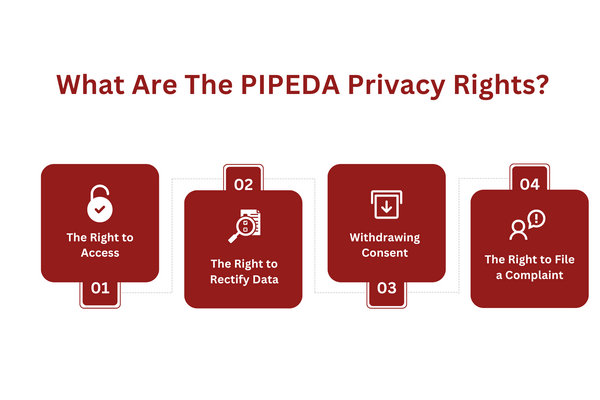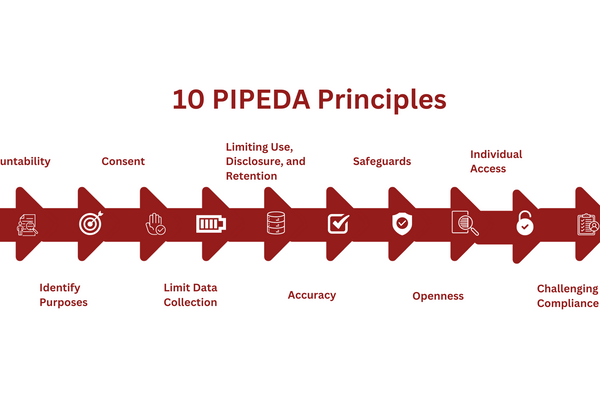
Data protection laws differ from country to country. For Canada, their data protection laws are based on the 10 principles of the PIPEDA. These principles are what shape PIPEDA, and commercial businesses have to work towards compliance with these principles.
If you have a business located within Canada’s jurisdiction, then you may want to read this article. This article will inform you of the 10 principles that PIPEDA requires you to follow so that you can ensure that your business is compliant with its current data regulation laws.
Let’s dive in.
Key Takeaways
The PIPEDA is a collection of data protection laws that are established under its key principles. It gives Canadian citizens data rights and challenges businesses to be compliant with their requirements.
The 10 principles of the PIPEDA are what shape the data protection laws in Canada. Some of these principles include the principle of accountability and the principle of transparency, among other things.
All private sector businesses must follow PIPEDA compliance in order to remain operational. Compliance can be established by utilizing some basic tips, such as staying up to date on PIPEDA regulations and training your employees on how to be compliant.
PIPEDA Explained
What is PIPEDA (1).jpg

PIPEDA (also known as the Personal Information Protection and Electronic Documents Act) is a privacy law in Canada that governs businesses in their use, disclosure, and collection of personal information data of their subjects.
The PIPEDA was first introduced in 2001 but wouldn’t come into full effect until January 1, 2001, and then later its first amendments in 2004.
The benefits that the PIPEDA gives to its Canadian citizens are data protection rights, such as the ability to access personal information on file and the ability to opt-out consent for their data being collected and used by businesses.
Additionally, PIPEDA also created 10 base principles businesses have to follow to give consumers more control and reassurance.
With the PIPEDA in effect, all commercial businesses must follow its key principles and must develop policies that respect the individual’s consent before the act of collecting their data, as well as offer other services to follow compliance.
It is essential for businesses to follow the provisions of the PIPEDA because non-compliance can land up to 100,000 CAD per violation.
What Are The PIPEDA Privacy Rights?
What Are The PIPEDA Privacy Rights.png

There are a variety of rights that the PIPEDA provides for its citizens. Below are the rights that are outlined that all data subjects have under the PIPEDA.
The Right to Access
All citizens in Canada have the right to request the right to access their personal information that is on file from a private sector business.
If you’re a business owner, then that means you will have to honour the data subject access request if you have any data collected on them. If so, then you must grant them access to any data that you have on file regarding the individual.
The Right to Rectify Data
Data subjects also have the right to demand rectification of their personal information ( to correct or amend their data). Rectifying can mean correcting, moving or deleting of all or certain aspects of their data.
Rectification should be taken seriously in order to address data accuracy. In most cases, this is beneficial for your business as well because having accurate data on file can help maintain your business operations.
Any rectifications must also be shared with other third parties that the data has been traded with in order to make adjustments to the data to be more accurate.
Withdrawing Consent
Under the PIPEDA, all individuals have the right to withdraw consent at any moment they decide not to partake in the act of having their personal information collected.
Acquiring consent is mandatory in order to collect any data on the individual. The individual may also be able to withdraw their consent at any given moment and do not have to provide an explanation for their reasoning.
The Right to File a Complaint
The PIPEDA expects all of its data subjects to exercise their data protection rights and to challenge any business that they expect isn’t following PIPEDA compliance standards.
Getting multiple complaints from data projects can lead to investigations from the privacy commissioner and could potentially be detrimental to your business. It is important to take data subject complaints seriously and try to address them.
What Are The 10 PIPEDA Principles?
10 PIPEDA Principles.png

The PIPEDA is based on 10 privacy principles that enforce its strict data protection laws. Below are all ten of those principles that are explained so that your business can follow them in accordance with PIPEDA compliance.
1. Accountability
The first principle of PIPEDA is it aims to make all businesses accountable for their subject’s data.
Businesses that collect the information must be responsible for the safety and security of their data subjects’ information. Being irresponsible or not taking the correct measures to ensure its safety will lead to punishment by the PIPEDA.
2. Identify the Purpose of Collected Data
Another key principle is to promote transparency of data and its intended purposes.
Your business can not collect personal information from your customers just for the sake of doing it; rather, it needs a purpose. A valid purpose is so that your business can maintain its operations. For example, if you have a marketing department, then market research will likely require data collection.
3. Acquire Consent
The principle of meaningful consent is very important because it prevents the authorized collection of user data. Most private sector businesses will have to ask for consent from their data subjects before moving forward with gathering and using their data.
There are ways to make acquiring consent easy for businesses. Developing methods of opt-in or opt-out is the best way of doing it. These can be in the form of cookie banners or windows that allow data subjects to ask for consent (opt-in) or have a place on your business website to give or withdraw consent easily (opt-out).
If you collect sensitive information, opt-in (cookie banners) are required.
4. Limiting Collection of Data
The principle of limiting data collection is to ensure that businesses do not go overboard in gathering what is excess but rather what is only mandatory.
Your business must define what is the minimum amount of data collected from the subjects for it to carry out its intended purpose. Acquiring too much can lead to improper storage or management, which could develop into data privacy concerns. Additionally, it puts unnecessary risk on the people if there is a data breach.
5. Limit Use, Retention and Disclosure of Data
This principle demands that businesses restrict the number of uses they intend to do with the data, as well as limit the duration of its storage and the disclosure it has with other third parties.
A business must acquire data with the intent of its original purpose. If that purpose changes, then the business must make an effort to acquire consent from the data project. If no consent is given, then the business can not use it for any new purposes.
The same goes for disclosure. A business can not disclose with any other business unless the data subject gives consent.
If the data has achieved its purpose and has no other use, then the business is obligated to delete the data on file to help mitigate data privacy issues.
6. Accuracy of Data
Under this principle, businesses are required to make sure that any data they have on file of their subjects is accurate and up-to-date to prevent the spread of misinformation.
All data must be precise and have all the correct facts regarding the data subject’s information and status. The following compliance will involve making frequent data audits to update old client information.
The business should make efforts to screen the data subject to ensure that the information on file is correct or that they are allowed to carry out its tasks using it.
7. Safeguard Implementation
The principle of safeguarding implementation mandates that all businesses follow the necessary procedures to ensure that the data is safe and protected from external forces.
If your business engages in the act of data collecting, then it will be your responsibility to make sure that it is well protected by creating safeguards for it.
Safeguards can come in the form of limiting employee access control, stargazing the data through secure methods such as encryption, and enabling high-security protocols that reduce the risk of a data breach occurring.
8. Openness
The principle of openness is to ensure that businesses are actually open and transparent towards their data subjects regarding the act of data collecting and its intended purposes with the data.
Disclosure with your business clients needs to happen in order to be PIPEDA compliant. You will want to disclose your business policies regarding the handling of the data subject’s personal or sensitive information and explain how it will be used and what methods your business is utilizing to protect it.
9. Individual Access to Data
Under the PIPEDA, access to data is a principle that all data subjects should be able to achieve with the request.
Providing individual access involves giving the data subjects information regarding their data. They should be informed about when the data was collected, how it is used and if it has been shared with any third-party business, and who those parties are.
In addition, the data subject will also have the ability to revoke consent if they are not okay with any of the above as mentioned. They could either request to rectify their data or withdraw completely.
10. Challenging Compliance
The PIPEDA actively encourages data subjects to exercise their rights and to challenge businesses in their ability to provide compliance services.
If you are a business owner who falls under the PIPEDA criteria, then you should be prepared to have your compliance policies challenged. Your business should have processes that pertain to the receiving, reviewing, and addressing of complaints for being non-compliant.
Tips for Businesses to Be Compliant Under The PIPEDA
Having your business operate under PIPEDA can be challenging to establish at first. Luckily, there are some general tips to follow that can help. Below are some tips you can follow to help ensure that your business is compliant with the PIPEDA.
Keep Up to Date of PIPEDA regulations
The PIPEDA has had amendments over the years and can be subject to change. Understanding the current regulations can help greatly in reducing the chances of being non-compliant.
The best way to stay up-to-date on PIPEDA laws is to follow the news regarding data regulations. Joining privacy communities can also help you stay informed of laws and current events in the world of data protection laws.
Train Your Employees
It’s one thing for you to know all the PIPEDA regulations, but having your team know the current data laws as well can greatly increase your business’s likelihood of maintaining its compliance.
Getting your employees involved will require you to communicate the importance of data privacy laws. Creating compliance training materials for your employees to learn can help them understand the topic and always have the means to reference it when needed.
Ensure that only employees only collect or process necessary data, ensure that regular assessments are conducted for accuracy of data by the data protection officer or relevant employees.
Setup Reasonable Security Measures
One of the many reasons businesses fail in compliance is by not setting up the proper security safeguards to protect their data subject’s information.
Implementation of extra security safeguards for your business can help reduce the chances of a data breach occurring.
Some examples of reasonable safeguards are conducting regular data assessments whenever data is accessed, edited, or deleted. Utilizing encryption techniques for the data stored can also make unauthorized access to data more challenging.
Respond to SARs ASAP
Subject access requests (SARs) from your data subjects should be addressed as soon as possible. Failing to do so could lead to the PIPEDA privacy commissioner conducting an investigation into your business for non-compliance.
Most complaints can be addressed by communicating with your data subject on what their issues are. Being transparent and respecting their rights as data subjects will eliminate any worries of having a non-compliant investigation occur on your business.
Closing
The principles that the PIPIEDA mandates impose challenge business owners to remain compliant. However, having a team of PIPEDA experts can help those businesses be ready to handle any compliance situation thrown at them.
If you are one of those business owners that is struggling with PIPEDA compliance, then consider outsourcing your compliance services to us here at Captain Compliance so that you can feel at ease knowing your business is following all its PIPEDA regulation standards.
Get in touch with us for guaranteed compliance today!
FAQ
How does the PIPEDA ensure businesses are demonstrating openness?
The PIPEDA ensures openness by requiring businesses to be transparent and open about their policies regarding data collecting. Transparency is also established by answering data subject access requests.
Learn more about DSARs in our detailed article here.
How can individuals challenge business under PIPEDA compliance?
The PIPEDA encourages its citizens to challenge compliance by filing complaints whenever a business fails to address any of its rights or when it is not following the principles of the PIPEDA.
Read more about compliance services businesses use to address data subject complaints.
Does PIPEDA apply to any public sector in Canada?
The PIPEDA was meant primarily for private-sector businesses to ensure their compliance with data protection laws. However, public sector businesses are still required to follow data protection laws and failing to do so can result in federal punishments for those responsible.
Read more about DSAR exemptions in our article here.
How does PIPEDA address the use of cookies for businesses to be compliant?
The PIPEDA ensures that individuals must be informed that their data is being collected and tracked through the use of cookies. Typically, it is done through cookie banners, which data subjects can either opt in or out of.
Learn more about opt-in and opt-out methods businesses use for gaining consent online.